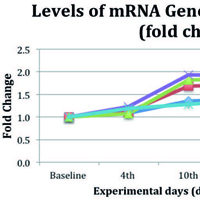Curcumin effects in inducing mRNA gene cathelidicin antimicrobial peptide in Balb/c mice infected with Salmonella typhi

Submitted: March 7, 2020
Accepted: July 18, 2020
Published: August 24, 2020
Accepted: July 18, 2020
Abstract Views: 929
PDF: 551
Publisher's note
All claims expressed in this article are solely those of the authors and do not necessarily represent those of their affiliated organizations, or those of the publisher, the editors and the reviewers. Any product that may be evaluated in this article or claim that may be made by its manufacturer is not guaranteed or endorsed by the publisher.
All claims expressed in this article are solely those of the authors and do not necessarily represent those of their affiliated organizations, or those of the publisher, the editors and the reviewers. Any product that may be evaluated in this article or claim that may be made by its manufacturer is not guaranteed or endorsed by the publisher.

 https://doi.org/10.4081/jbr.2020.8942
https://doi.org/10.4081/jbr.2020.8942



